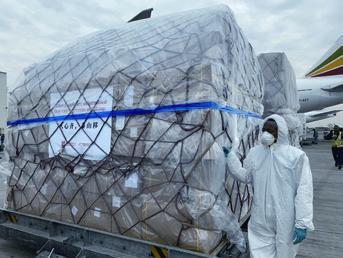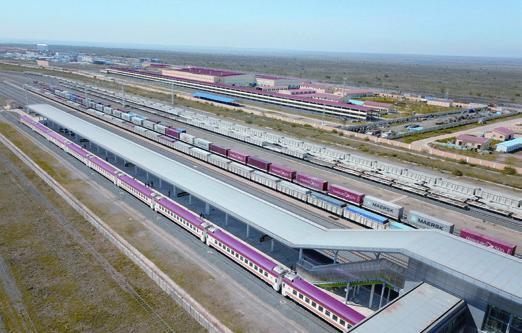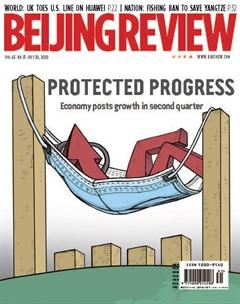Toward A Shared Future
By Charles Onunaiju
Even before the dust of disruptions and devastation inflicted on lives and livelihoods by the novel coronavirus disease(COVID-19) pandemic settles, robust conversations and actionable roadmaps are well underway to facilitate a global recovery and, in particular, uplift struggling economies in Africa.
The sinister COVID-19 pandemic has resuscitated the urgent need for the recognition of a common humanity. If there has been an iota of doubt that the global community is intrinsically and irrevocably tied to a common destiny and shared future, the outbreak of the pandemic cleared that up. The dread of thermonuclear confl agration and the corollary of a mutual balance of nuclear capabilities among major powers as a meaningful deterrent have completely paled into insignificance when compared to the disaster infl icted by the pandemic.
However, lethal as it may be, COVID-19 has also exposed the reality of humankinds most potent weapon to confront the assault of its common affl ictions, namely, solidarity and cooperation.
In 2013, Chinese President Xi Jinping outlined a vision of international cooperation. He laid out a framework for the construction of a community with a shared future for humanity, with a practical roadmap of networks of infrastructure connectivity across land, maritime and air routes, thereby giving the concept of a global village a concrete expression.
The launch of the Silk Road Economic Belt and the 21st-Century Maritime Silk Road, known as the Belt and Road Initiative, is a major game-changer in the international governance system. It offers the impetus of consultation, collaboration and cooperation, critical tools of strategic international engagement that have proved extremely useful in the outbreak of COVID-19.
In a letter to the High-Level Video Conference on Belt and Road International Cooperation on June 18, Xi said, “Be it in taming the virus or in achieving economic recovery, we cannot succeed without solidarity, cooperation and multilateralism. The right approach to tackling global crises and realizing long-term development is through greater connectivity, openness and inclusiveness. This is where Belt and Road international cooperation can make a big difference.”

For African countries, which are key partners in the Belt and Road Initiative, the difference that would be made in the postCOVID-19 recoveries of their economies through more engagement with the initiative cannot be overemphasized. For Africa and the rest of the world, the negative impact of the COVID-19 pandemic has been well documented. There is considerable consensus that post-pandemic recovery efforts would feature enhanced trade and increased domestic productivity, which would leverage efficient infrastructure. The strategic requirements for a speedy recovery and normalization of post-COVID-19 era are entrenched in the key elements of the Belt and Road Initiative.
As Chinese Foreign Minister Wang Yi said at the high-level video conference, the Belt and Road Initiative “has evolved into the largest platform for international cooperation, playing an ever more important role in promoting development and prosperity around the world.”
And to underline the practical signifi cance of the initiative, he said in 2019, trade in goods between China and other Belt and Road Initiative participants topped $1.3 trillion, up by 6 percent year on year. Chinese investment in these countries increased by $15 billion. In the fi rst quarter of this year, their trade rose by 3.2 percent, and direct investment by China was up by 11.7 percent on a yearly basis.
Even during the pandemic, the Belt and Road Initiative has advanced considerably, with phase one of the Nairobi-Malaba Railway coming into operation. Signifi cantly, between January and May, the China-Europe freight train service witnessed a surge of 28 percent in trips and 32 percent in freight volume, witnessing the transportation of 12,524 tons of medical supplies. This served as a key cargo lifeline.

Far from holding countries back from the Belt and Road Initiative, COVID-19 has only underscored its strong resilience and vitality. There is no doubt that the initiative, whose foundation is already well aligned to the challenges of an international emergency, will be an indispensable driving force to bring brighter prospects to the world.
Africas critical challenges in the pandemic and even the post-COVID-19 era could be reasonably addressed by the key and functional tools of the Belt and Road Initiative. The initiative outlines which international public goods align to the urgent needs for recovery and stabilization in Africa. Be it robust trade, critical and enabling infrastructure and the two engagement mechanisms of consultation and cooperation, the path to recovery and sustainable growth is clear.
Since 2018, when the Beijing Summit of the Forum on China-Africa Cooperation was held, many African countries have made the historic decision to enter into partnership with the Belt and Road Initiative framework of international cooperation. The challenges of the pandemic uniquely offer African countries an objective condition to not only reconsider the opportunities of the partnership, but also vigorously access it. The initiative will not be a wand that would magically solve all problems, especially the herculean challenges of postCOVID-19 recovery, but will certainly add to the arsenals of domestic policy initiatives of many participating countries and bring them to the path of sustainable and inclusive growth.
The Belt and Road Initiative and its dialogue framework rooted in extensive consultation, joint contribution and shared benefi ts align with the emerging international structure of multilateralism, which was the goal of the historic struggles of the South, of which Africa has been the spiritual mainstream.
Beyond its symbolic significance as the bridge of comprehensive partnership between the North and the South, the initiative is practical and functional, offering diverse global public goods that could fi t the specifi c national requirements of participating countries in a coordinated manner. This would strengthen the global system and advance humankind to a community with a shared future. Africa must fi nd a niche in this process, especially in the current context of COVID-19 and its aftermath.

